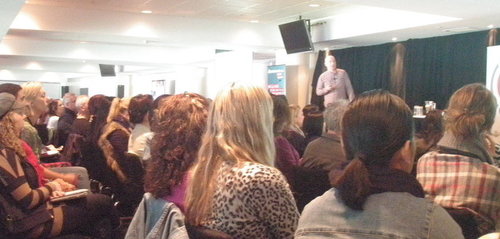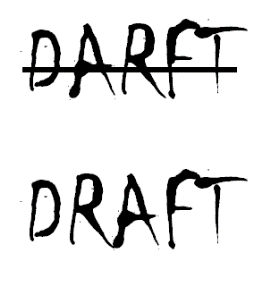I hope you find my writing and business tips and observations useful. My business and blog are dedicated to helping businesses communicate clearly and reach their potential.
Read, subscribe to my newsletter, enjoy!Tash
Accepting feedback graciously
Anybody who puts effort into writing good content understands the anxiety that can come when someone else reads those words you worked so hard on.
In fiction or business, writers like to think they are using the best words to suit the need yet have to consider their audience’s tastes and preferences, too.
Hearing feedback
Don’t think for a second that highly respected, top-selling authors don’t get their work reviewed and edited by other people – this is not just a business writing issue.
However, what can be different for any business writing is the range of feedback that may be required – one piece of writing may have to satisfy people from legal, marketing, administration, technical and sales teams.
Some people get uptight about feedback as they see it as criticism. Others hear it but rarely act on any of it, while others take note of all the feedback and lose their own feel for the writing.
How do you cope with feedback on your writing? Do you accept and even ask for feedback?
Getting feedback on technical details (for example a client tells me their product is 25 mm thick not 26mm as I wrote) can be easier to take than other feedback as you aren’t expected to be the technical expert.
Feedback about something you are meant to be good at is harder, but usually still isn’t meant personally and needs to be taken professionally.
Improving your writing
Gathering and assessing feedback is a key to getting the best results out of any writing.
Putting together all the different elements can be challenging but melding it together works mush better than having distinct bits of text from each area.
A good piece of business writing often is the collective wisdom of a team with the writer adjusting all those elements to read well. It isn’t about the writer producing perfect prose on their own.
Believing in the team effort and getting the best results for the business makes it much easier to accept feedback.
Once you can accept feedback and tweak your writing to suit, the better your writing will be and the less stressful you’ll find the corporate process.
Bloggers together have power
Today is Blog Action Day 2012 (BAD12). That means over the next 24 or so hours many bloggers will be publishing a post about the power of we, showing that diverse people can come together to make a difference.
For me, the timing makes this post easy – I just spent most of the weekend with 3oo fantastic people at the problogger event so have a better sense of the power of we within blogging.
The power of we at a conference?
At one level, we were just a group of people sitting in the same room listening the same speakers.
But it was way more than that.
People were talking, mingling and supporting each other – not just for those 48 hours but building relationships that can move us forward in the days and months to come. The organisers and speakers not only encouraged us to mingle (one speaker, I think it was James Tuckerman of Anthill, told anyone sitting next to a person they came to pbevent with to sit somewhere else in the next session) but had made it easy to do so with generous breaks between sessions and a cocktail party on Friday night.
Amongst many other topics, we discussed payment for our work, such as being paid by a brand to promote them within our blogs. While there was an understanding that someone with more traffic and influence can probably charge more than a new blogger, there was a consensus that bloggers should bot accept free or very cheap ‘work’.
The point was that we all deserve to have our time recognised and paid for. And by accepting lower rates we can cheapen the work and efforts of other bloggers as well.
It’s also one reason I hate those content mills where people can buy webcopy, blog posts, articles, etc for a fraction of the price professionals like me charge – it makes it harder for us to earn decent pay rates for our time and expertise if clients think they can get it done much cheaper (especially those clients who don’t understand how to judge quality writing).
Working together and setting some industry standards helps all bloggers and writers.
Discussing those standards at PB Event gave us not only a framework but the confidence to stick to it for a reason beyond ourselves.
The power of we at work.
What we can achieve
Leading up the PB Event, problogger (Darren Rowse) himself set a challenge.
If we could fundraise $240, he would attend the final session on Friday in a school dress. A few more targets were added when the $240 was reached in one donation, with the final level being $2,400.
It was fun, but the point was to raise money to help girls in Sierra Leone go to school – $240 sends one girl to school for a year.
I was sick to the stomach to find out a girl is more likely to be sexually assaulted than go to school in Sierra Leone.
Think about what that means. It’s awful.
I’m pleased to be part of PB event where we raised enough to send 10 girls to school.
It isn’t enough, but it is a start and shows we care. Sending 10 girls to school will make a difference to them, their families and presumably their communities.
Darren challenged us to all do the same, to see how much money 300 bloggers’ communities could raise, how many more girls go to school.
Given it is blog action day, I wonder what would happen if all bloggers around the world tried raising some money by doing it in a dress – could we get every girl in Sierra Leone to school?
Could we make it so school is more likely than assault for a nation of girls?
The power of we is strong. Let’s use it for good.
Why alienate your audience?
I have just finished reading a book my daughter has read a few times. I was actually keen for her to read books by this author as she is Australian, writes about the meeting of cultures and seems to give a positive outlook to teenagers.
Now, I’m not so keen.
I actually found parts of this book (and admittedly it was her first) unsettling – and I’m unlikely to read another. by this author.
Writing about Melbourne
The book is clearly set in Melbourne – the characters live in Camberwell, eat Vegemite, visit Lygon St for pizza and gelati, Acland St for cakes and belong to the Debating Association of Victoria (DAV). All those details are named and a theme of the book is a girl finding her identity as a ‘hyphenated Australian’.
So why does she ‘catch a streetcar’ to a ‘mall’ with her ‘mom’ wearing ‘flipflops’ or discuss clothing choices for a 58 degree day or ‘keep to the right’ when skating at St Kilda beach?
I’ve never caught a streetcar or worn flip flops in my life, but have been in many Melbourne trams and often worn thongs. Australia is metric so her 58 degrees farenheit would be known as 14 degrees (ah, now her comments about the girl being under-dressed make sense!) and if you stick to the right on our roads and paths you’re likely to get arrested if not killed!
Consider your audience
I often read books that were written for other countries, including the USA. I mentally ‘translate’ them into my experiences. So someone is facing a difficult left hand turn in the book and I picture it as a right hand turn to understand the context. I read ‘mom’ as ‘mum’, ‘color’ as ‘colour’ and struggle over imperial references.
That’s okay when I’m reading an American book.
I resent it in an Australian book.
If you are sharing an Australian experience with readers, make it authentically Australian by using Australian terminology and spelling. To do otherwise alienates your Australian audience.
Maybe her purpose was to write for the American audience because it is larger. Then why make it so clearly about Australia? Why insult Americans to say they can’t read a book and ‘translate’ terms into their context?
In a book trying to show how cultures are different but can co-exist, I found it uncomfortable that she didn’t stay with the Australian culture. It felt hypocritical. And that she was demeaning Australian culture.
Back to business…
You may not be writing books about cultural clashes, or even in a business that has much cultural diversity to deal with, but the point is the same.
It’s important to know your voice and stick to it.
To know your audience and understand it – not just what they can understand but what could be insulting or offensive.
To really think about what you are communicating between the lines.
To realise that the USA is not the world and that it’s ok to do things in a locally appropriate way instead of copying the American way by default.
A new way to get creative!
We’re all creative, it just gets a bit lost under all the stuff we have to do as adults.
I think it’s sad that so many people say “Oh, I’m not creative – can’t draw a thing”. Creativity isn’t about being able to draw (well, not exclusively about being able to draw!) and certainly isn’t about doing things to some external standard (who’s to say the drawing I made for fun or to capture a memory isn’t any good? It may not sell for millions or get an art critic’s approval, but that doesn’t mean it’s no good for me.)
Creative just means being able to think in different ways. It’s useful for problem solving, innovation and having fun as well as for creative pursuits such as drawing, writing music and knitting a jumper.
I even think you need to be creative to write well for business materials – it’s not just fiction writers who use words and ideas creatively.
So I believe in doing things to encourage creativity – I try for myself and my children.
And I could write heaps more on developing creativity!
Song writing makes you creative
Yesterday, I had lunch with my young children and somehow we got onto rhymes and songs. As you do with two and three-year olds!
My son then challenged us to write songs. With rhymes. On topics he chose.
All while thinking of a tune to put the words with.
It wasn’t easy – and my songs wouldn’t win any awards or go platinum, but it was fun.
It also woke me up and I returned to my computer fresher and with great ideas. Getting creative sparked my brain into being more creative.
Try writing songs for yourself…
You don’t have to have a three-year old urging you – just spend five minutes writing some songs. And singing them, of course!
 Some of the topics I was given yesterday were…
Some of the topics I was given yesterday were…
- doctors and the sick people
- cows eating grass
- potatoes eating yoghurt, potatoes eating carrots
- a cat with sticky tape
At worst, you’ll have a laugh and a change of pace. At best, you’ll be more creative and think of new ways to use words.
Feel free to share some of your lyrics in the comments, too, to give us all a giggle and some inspiration!
Are you brave enough to run this as an activity with your business team?
How to get writing, no matter what
Finding it hard to write on demand, struggling with ‘writer’s block’ or doubting your ability to get something written?
Long ago I decided I didn’t have the luxury of ‘writer’s block’ and I can write on demand rather than waiting for inspiration or the right mood. There are certainly times when I really don’t feel like it, but I have found ways to keep writing anyway.
Some people will say writing when you don’t feel like it means your writing isn’t as good. That maybe true for creative writing (although many novelists would disagree) but if you write professionally you have to meet deadlines for clients whether or not the whim takes you.
Tips for overcoming writer’s block – or writer’s hesitation
Here are some useful techniques, some are well known and some have been really valuable for me over the last nine or so years.
If you have any great tips on how you overcome writer’s block, please share your ideas in the comments section below.
- just write. It doesn’t matter what you write – just sit at a keyboard or with pen in hand and write for five minutes without stopping. It gets ideas flowing and sometimes gets doubts out of your head. You may find you are ‘in the mood’ well before your five minutes is up…
- forget the start. If you’re sitting in front of a blank page not knowing how to introduce a document, or what title to give it, start writing the middle of it. For an article, write the middle and come back to the introduction and title; for a longer document, choose any chapter but the first and write that. Apart from getting you started, an intro or title often needs revising once the rest is written anyway so leaving it to last makes a lot of sense
- if you know broadly what has to be written, write out all your headings and sub-headings for the document. It’s much easier then to just fill in the text between headings in whatever order you feel like
- give yourself permission to just write – don’t worry about typing perfectly, getting spelling and grammar right, or having the perfect word in every instance. Get your first draft written and your project is underway – much better to have it all written and spend time proof reading than to have only a paragraph or two written in the same time.
- know yourself so you can set up the best conditions for writing. It may be first thing in the morning, after doing some exercise, with music playing or in silence, at a keyboard on a desk, or any combination of circumstances but use your environment to encourage your writing
- like that proverbial elephant, don’t expect to tackle a big project in one go. Set yourself small targets – yes it can be ‘have the first draft finished by Thursday’ but it can also be goals like ‘write for 20 minutes then check emails’ as doing something hard or unpleasant is easier to face for a short time
- build habits – if you sit at your computer to write at 10 o’clock every day, your mind will expect that and be ready to write
When it comes down to it, the only solution is DO IT!
I find that if I don’t feel like it but start typing I get into it and can write the document easily – and often finish it ready for another! If none of the above helps get you writing, your other option is to ask someone else to write the document or web content for you.
Effective content starts with a draft
Good content starts as an idea that is drafted onto paper or screen and gets developed through editing and revisions.
I once had a conversation with another business person we’ll call Mel:
Tash: Just get the ideas onto the page. It doesn’t matter about spelling, grammar, proper sentences or even the order. Just get things down to get started – it’s the best cure to writer’s block or procrastination.”
Mel: {laughs} Just don’t tell YOUR clients that’s what you do!
Sometime later, I am still wondering about why Mel said that.
 Admittedly, not many of my first drafts are that rough (I spell and use grammar instinctively so even drafts read ok) but that’s not the point.
Admittedly, not many of my first drafts are that rough (I spell and use grammar instinctively so even drafts read ok) but that’s not the point.
There is nothing wrong with a first (or twentieth if need be!) draft, nor with a first draft being an awful mess. No one else would ever see a rough first draft but it serves a purpose to why not admit to creating rough drafts?
I don’t expect a designer to instantly produce me a perfect web page or eBook layout – I know I’ll see drafts so I can confirm what I do and don’t like to get a finished product that suits my need.
I don’t think any writing client would be upset that I have drafts – it helps them get a better final result. And if they’re paying for the finished wording, they really don’t care how many drafts it takes me!
Do you relate to what Mel said? Would you hide the fact you started with a rough draft in order to produce something professionally?
When an essay isn’t an essay
This week, many Australian students have been sitting the NAPLAN tests. One of the tests is about writing and the students are given a topic to write an essay on.
For my daughter, this was her fourth NAPLAN experience. After a trial essay in class last week, she was panicking about the writing NAPLAN. Being told she’s good at writing essays didn’t give her any comfort until she finally told me she ‘had never written an essay in her life and didn’t know what one was’.
Throughout primary school and early secondary school, the kids have been taught various types of writing (I know I was never formally taught such a range as specific styles!) such as an argumentative piece, an opinion, instructions and a report. Yet no one had ever thought to tell all of them that an essay is just another term for a persuasive or argumentative piece!
Once I realised this was the issue, my daughter regained her confidence in essay writing and believes she did a good answer in her writing NAPLAN.
My children think of persuasive pieces, I think of essays – what do you call a piece of writing that covers a topic to make a case for their opinion?
Understanding jargon
When I went to school, we were never taught to write an argumentative or persuasive piece – we wrote essays. Technically, there is no difference but a change of terminology requires care.
If you teach kids to write persuasive pieces you can’t test them on essays unless you define and explain what an essay actually is – they have no experience of essays and figuring it out during a test is not good for their test performance.
By now, the link to business should be obvious! No matter what you are writing for a business or website, you need to be sure the intended audience will understand it.
Just because you are very familiar with jargon (technical or industry specific terms for things) and abbreviations does not mean your readers will be. So it is important to avoid jargon as much as possible.
In some contexts, using jargon is fine (for example, a doctor won’t write about an intestinal disease by saying the symptom is a sore tummy). However, it is still important to minimise the jargon use to be sure it is understood. Going back to our medical example, if a gastroenterologist is writing for a general medical audience she could use medical terms but perhaps avoid very specific terms that other doctors won’t know.
Naming and defining
Whenever you do use jargon or industry specific terms in a business context it is a good idea to define the term.
You may be able to define terms at the first use of it or perhaps have a glossary page which each use of the term can be linked to.
Adding definitions is a good idea even if you are confident your audience knows the jargon because:
- it ensures your understanding of a term is the same as your reader’s understanding
- it helps someone new to your field understand your content – a new doctor will know most of the jargon in an article but may need to check on some words for instance
- having words defined on a website can help with your SEO efforts
- it is useful for someone researching your topic. These people may not be your target audience but helping them can lead to good will – and some of those people may well enter your field later and remember who helped them learn the jargon in the first place
- if there are two or three common terms for something, don’t assume everyone knows them all. Such as my daughter not knowing ‘essay’ and ‘persuasive piece’ are essentially the same thing or someone in NSW not knowing kinder comes before Prep in Victorian schools.
Does your website include definitions of words that are potentially difficult for you audience to recognise or understand? Have you ever reviewed your website for words and terms that may be considered jargon?









Recent Comments